Please introduce yourself!
I am Maria Daniela Castillo, from Bucaramanga, Colombia. I’m 25 years old and I hold a B.S. in Environmental Sciences from the University of Wisconsin in Madison. I am the Co-Founder of UpTica, together with Nicol Chinchilla and Sasha Drumm. We became Resolution Fellows upon winning the Social Venture Challenge hosted by Semester at Sea in Spring 2015.
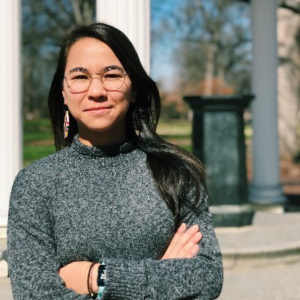
What three adjectives would people use to describe you?
Driven, caring, adventurous.
What is the challenge your venture seeks to address?
UpTica seeks to address the lack of economic opportunities women in rural Costa Rica have, as well as the accumulation of waste and its improper disposal. Costa Rica struggles with a 35% gender inequality rate. On average, women spend 2.5 more hours a day working without pay than men. As a country with a tourism-driven economy and traditionalist society, there are opportunities to address these gender-based challenges through sustainability initiatives. In rural areas, it is common to burn waste because it is not efficient to dispose of it by driving it to the cities. This issue affects women unevenly because they are the ones often working at home and burning the waste, hence inhaling toxic fumes that are detrimental to their health. Gender issues and the lack of opportunities in Costa Rica are thus related and can be tackled together.
Have you or your co-founders been personally affected by this issue? If so, how?
Our co-founder, Nicol Chinchilla, grew up in rural Perez Zeledon, Costa Rica, and saw these challenges first-hand from an early age. Nicol was inspired by her mom’s example. Mrs. Luz Cordero, Nicol’s mom, started working at her family farm and was able to employ herself and earn an income and achieve economic independence. However, other women in Nicol’s community did not have this opportunity which made her realize it was not the norm for women to achieve economic freedom in her community nor in Costa Rica more broadly.
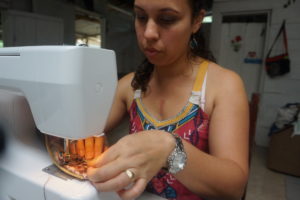
How is your venture addressing these challenges?
UpTica creates employment opportunities for women in two communities of Perez Zeledon: San Isidro and La Ribera. These job opportunities have flexible schedules and locations, meaning that women can adjust their hours according to family needs, and their work location can be based on proximity to the workshop and transportation options. UpTica’s collaborators gain technical skills in sewing, project management, accounting, marketing, social maintenance, and customer relations. Most importantly, however, collaborators get to build a community where they feel both supported and inspired. They empower themselves to work hard and improve their performance every day, and they provide an example of dedication and perseverance to women and children in neighboring communities.
In order to address waste challenges in rural communities, we opted to start upcycling second-hand fabrics. When we realized fabrics were sometimes used only once and then thrown into landfills, we decided to give these materials a new life and offer rural communities a new way of looking at “waste.” By making backpacks, fanny packs, wallets, purses, and more, women started becoming more creative and exploring new materials. We, therefore, decided to incorporate jute, a plant-based fiber usually used to make sacks. Although harder to work with at first, the final products turned out beautifully and were in high demand. Through collaborations with local vendors, farmers’ markets, and other social ventures, we have promoted UpTica’s products to customers across Costa Rica.
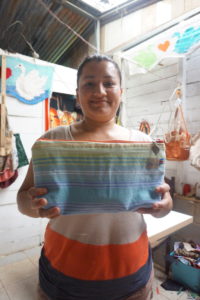
What inspired you to start your venture?
Nicol, Sasha, and I were inspired by the untapped potential of women in rural communities. We believe that with a little help on our end, women in rural Perez Zeledon can learn new skills, create new projects, and become leaders in their communities. We also know that economic empowerment benefits families and communities as a whole. Women and men spend money differently—women focus more on family-targeted goods and services. By providing economic opportunities for women, not only can we empower them, we can set an example for new generations. We focus on providing the right support to our collaborators, inspiring other women, and creating a model that can be replicated in other communities.
How has the Fellowship helped you achieve your goals?
The Resolution Project was the first organization that believed in our idea. The Fellowship reassured us that pursuing our goals with UpTica was worth it, thus giving us the confidence we needed to turn our ideas into reality. The seed funding was critical in helping us obtain the necessary resources to meet in-person with community members, as well as covering all costs for the first set of training we provided. Since obtaining the Fellowship in 2015, it has been extremely helpful to connect with other Fellows working on similar projects, even if they are based in countries in Asia, Africa, or elsewhere. It has been truly humbling to learn about the challenges other young change-makers are experiencing and what they are doing to overcome them. Similarly, it gives us strength to understand that there will be more challenges along the way, and that sometimes it may take time to find solutions, but that there is an entire community of Staff, Guides, and Fellows in The Resolution Project community that is willing to support us and point us in the right direction. These community members have helped us identify problems, brainstorm ideas, and find external resources when we needed them. Resolution has also given us visibility and has provided support to obtain external grants for UpTica’s work.
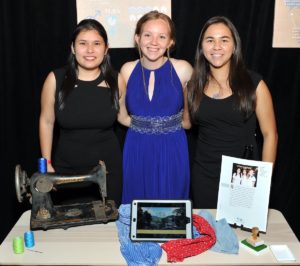
What advice would you give other college students who are looking to start their first social venture?
College may be the best stage to start a social venture! When we are constantly exposed to new knowledge in school, we rarely turn that knowledge into a tangible project. Oftentimes, when I had an idea for social impact during college, I would look up grant opportunities. When I found one that seemed like a good fit, I sat down to write down potential project ideas for the grant. I believe that when we are constantly learning new information, we should try to align this information with our passions and goals, and, if possible, turn them into a tangible project.
Faculty and staff are always happy to help students develop their ideas. To make the most out of college, students should seek one-on-one support for a project they are passionate about—earning academic credit, gaining research and grant-writing skills, and learning to communicate and develop their ideas to external audiences at the same time. Also, there are several grants, fellowships, and awards that undergraduates can apply for. My overall advice is that students who are interested in pursuing a project should consult with their professors, talk through their ideas with their classmates, and look for funding opportunities. There is a really good chance that they will be able to piece together a great plan!

What do you love most about your home community?
We love seeing UpTica’s collaborators take interest in learning new skills, imagining new products to work on, and inspiring their own children. It has been extremely gratifying to see how they have created their own problem-solving processes. When issues have arisen, women have not been afraid to speak up and share their feelings and frustrations, and they have done a great job in reaching agreements and following through.
What role do young leaders play in the world today?
Young leaders can create change and make an impact today! We have found new ways to work with communities, connect with one another across the globe, and leverage our networks for the benefit of all. As young leaders, we can bridge intergenerational gaps to create new collaborations and bring in different types of expertise to the table, and I think this is one of our strengths. We can create diverse and inclusive work environments, which helps us improve and adapt to emerging situations.
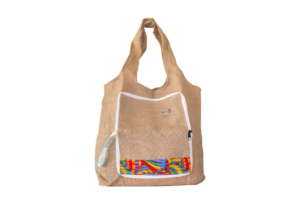
Why is it important for young people to focus on social impact?
Social impact is crucial in creating more equitable and livable communities. If we want to build communities where everyone has access to opportunities, where we can all enjoy healthy lifestyles, and where we know we are not harming the natural and built environments of future generations, we have to strengthen our social cohesion and social capital.
Tell more about your work in response to COVID-19.
With the pandemic, we shifted our focus to produce face masks—both for retail locally and wholesale nationally. We diverted most of our resources to the masks and were able to create high-quality products to help protect the health of our community. At UpTica’s workshop, women worked to reorganize their schedules to create safe environments for all in their shared space, and when possible, they worked from home.
What does Women’s History Month mean to you?
It is always wonderful to discover new stories of women who have made such great contributions to society. I am glad Women’s History Month highlights and gives visibility to important stories that have been blurred by gender data gaps, misinformation, or previous lack of societal interest. I have been fortunate to have had the opportunity to work with remarkable women who are doing impressive work, and I know that lifting each other up can be incredibly motivating and energizing for many of us.